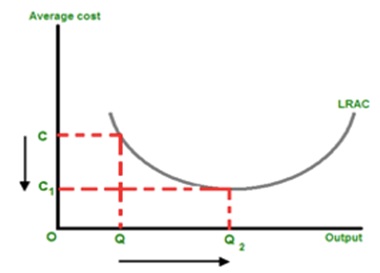Economies of scale arise when the cost per unit falls as output increases. Economies of scale refer to cost savings that a business achieves when it expands. Economies of scale can be achieved as a result of both external factors like training, improved infrastructure, and internal factors like financial outlay, sound management, and marketing advantages.
Economies of scale are the many advantages that a firm is likely to get as a result of expanding its activities and business. This means that as the scale of output goes up, the unit costs of production are likely to go down. The use of other inputs is also likely to reduce the costs that a firm will incur in the course of its producing goods. Economies of scale are likely to increase because as the firm expands, it will be able to have a high purchasing power that it will use to its advantage and buy bulky materials for long contracts.
When a firm expands, it will be able to get employees from a large pool, and in the process, it will increase its managerial capability. This will pay off as the managers will be highly specialized in the way they carry out their activities. The firm will be able to gain economies of scale financially because it will have the capability of being given loans at low-interest rates from financial institutions. In other terms, the given firm will have access to a greater range of financial products and instruments. Economies of scale are likely to occur because the firm will gain more in marketing. This is because it can spread its costs of advertising. These costs can be spread in different markets because of the broad range of output at its disposal.

